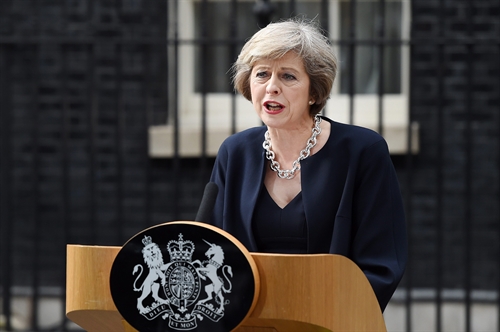 World
World

Theresa May took over as Britain’s new prime minister on Wednesday charged with pulling the country out of the EU, and sprung a surprise by making top Brexit campaigner Boris Johnson foreign secretary.
 |
| New British Prime Minister Theresa May addresses the media upon their arrival at No. 10 Downing Street, in London, Britain on Wednesday.— EPA Photo |
LONDON - Theresa May took over as Britain’s new prime minister on Wednesday charged with pulling the country out of the EU, and sprung a surprise by making top Brexit campaigner Boris Johnson foreign secretary.
May replaced David Cameron after he stood down following the seismic June 23 vote to leave the European Union, which sparked three weeks of intense political turmoil and volatility on the financial markets.
May, who had supported Britain’s continued EU membership, appointed leading "Leave" campaigner Johnson to a senior cabinet post while moving quickly to heal divisions sparked by the referendum.
But the decision to name Johnson, the eccentric former London mayor, to the high-profile post of representing Britain to the rest of the world has already proved controversial.
Johnson led the Brexit camp to victory, antagonising many EU leaders in the process, but dismayed supporters by backing out of the race to succeed Cameron at the last minute.
May ditched finance minister George Osborne, Cameron’s closest ally, and appointed former foreign secretary Philip Hammond to the job instead, charging him with the task of calming fears over the potential damage of leaving Britain’s biggest market.
Eurosceptic former ministers David Davis and Liam Fox were appointed respectively as Brexit negotiator and minister for international trade, two new posts reflecting changed priorities after the referendum.
EU leaders are pressing for a swift divorce following the Brexit vote, which sent shock waves around the world.
May had a phone call late on Wednesday with German Chancellor Angela Merkel, who invited her to visit, followed by calls with the French and Irish leaders, a Downing Street spokeswoman said.
May emphasised her commitment to delivering Brexit but "explained that we would need some time to prepare for these negotiations and spoke of her hope that these could be conducted in a constructive and positive spirit", the spokeswoman said of the calls.
’Burning injustice’
May, the second female British prime minister after Margaret Thatcher, has repeatedly said that "Brexit means Brexit".
But European Commission president Jean-Claude Juncker insisted the issue must be addressed "soon", a sentiment echoed by French President Francois Hollande in his call with May.
After formally being invited to form a government by Queen Elizabeth II, May arrived at her new Downing Street residence with a promise to tackle "burning injustice".
"Following the referendum we face a time of great national change," the 59-year-old told reporters, flanked by her banker husband, Philip.
"As we leave the European Union we will forge a bold new positive role for ourselves in the world. And we will make Britain a country that works not for a privileged few but for every one of us."
May said keeping the "precious" United Kingdom together was also a priority after the referendum, with the devolved Scottish government threatening a second independence vote.
Political stability
May’s appointment after a brief leadership contest in the governing centre-right Conservative Party brings some stability following a period of political disarray, which has also sparked a leadership challenge in the main opposition Labour Party.
Investors will be watching her first days in office closely but with greater optimism as the value of the pound, which fell by up to 15 per cent against the dollar after the Brexit vote, rallied in recent days.
On Thursday, the Bank of England will announce whether it will cut interest rates for the first time in more than seven years to curb the economic fallout from Brexit.
May is something of an unknown quantity internationally, but European Council president Donald Tusk said he looked forward to a "fruitful working relationship" with her.
Russian President Vladimir Putin said he was ready for "constructive dialogue" with Britain’s new premier, while White House spokesman Josh Earnest said that US officials who had worked with May "found her to be quite effective".
May campaigned for the leadership as a safe pair of hands, after spending six years as home secretary, one of the toughest jobs in British politics. -- AFP




